Psychology for Health and Social Care: Life Span Development Report
VerifiedAdded on 2023/02/02
|11
|3087
|60
Report
AI Summary
This report delves into the realm of health psychology, focusing on the interplay of psychological, behavioral, and cultural elements in the context of health, illness, and healthcare. It examines life span development theories, including behavioral, cognitive, psychodynamic, and humanist perspectives, and contrasts Erikson's psychosocial theory with Freud's psychosexual theory. The report explores the influence of social and biological factors on human behavior, addressing the nature versus nurture debate. Furthermore, it analyzes the importance of social roles in health and social care, emphasizing the role of social workers in fostering positive relationships, promoting social inclusion, and addressing the challenges faced by individuals with disabilities, illnesses, and socioeconomic difficulties. The report also incorporates a case study to apply psychological theories and principles to real-world scenarios in health and social care settings, providing a comprehensive understanding of the subject matter.
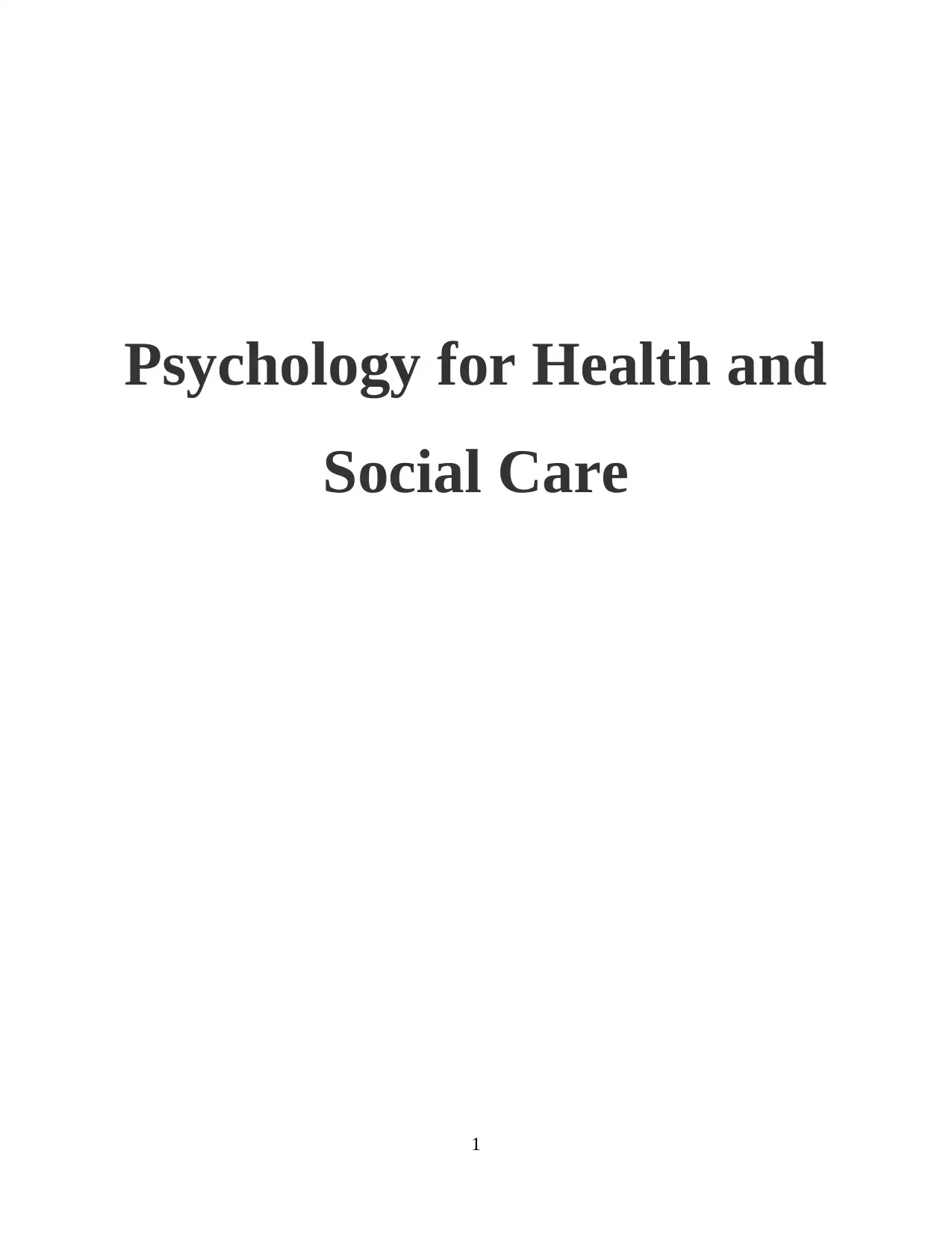
Psychology for Health and
Social Care
1
Social Care
1
Paraphrase This Document
Need a fresh take? Get an instant paraphrase of this document with our AI Paraphraser
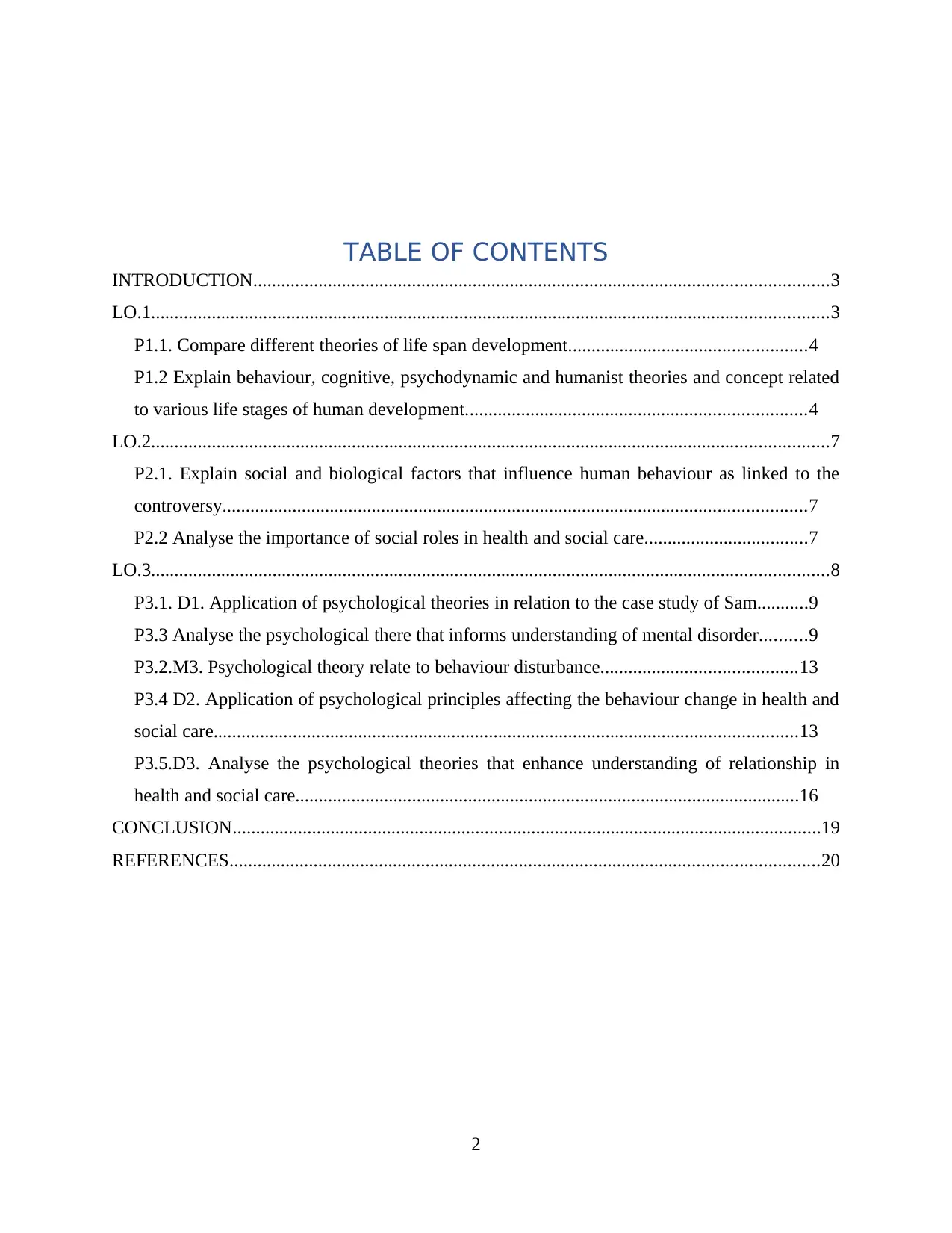
TABLE OF CONTENTS
INTRODUCTION...........................................................................................................................3
LO.1.................................................................................................................................................3
P1.1. Compare different theories of life span development...................................................4
P1.2 Explain behaviour, cognitive, psychodynamic and humanist theories and concept related
to various life stages of human development.........................................................................4
LO.2.................................................................................................................................................7
P2.1. Explain social and biological factors that influence human behaviour as linked to the
controversy.............................................................................................................................7
P2.2 Analyse the importance of social roles in health and social care...................................7
LO.3.................................................................................................................................................8
P3.1. D1. Application of psychological theories in relation to the case study of Sam...........9
P3.3 Analyse the psychological there that informs understanding of mental disorder..........9
P3.2.M3. Psychological theory relate to behaviour disturbance..........................................13
P3.4 D2. Application of psychological principles affecting the behaviour change in health and
social care.............................................................................................................................13
P3.5.D3. Analyse the psychological theories that enhance understanding of relationship in
health and social care............................................................................................................16
CONCLUSION..............................................................................................................................19
REFERENCES..............................................................................................................................20
2
INTRODUCTION...........................................................................................................................3
LO.1.................................................................................................................................................3
P1.1. Compare different theories of life span development...................................................4
P1.2 Explain behaviour, cognitive, psychodynamic and humanist theories and concept related
to various life stages of human development.........................................................................4
LO.2.................................................................................................................................................7
P2.1. Explain social and biological factors that influence human behaviour as linked to the
controversy.............................................................................................................................7
P2.2 Analyse the importance of social roles in health and social care...................................7
LO.3.................................................................................................................................................8
P3.1. D1. Application of psychological theories in relation to the case study of Sam...........9
P3.3 Analyse the psychological there that informs understanding of mental disorder..........9
P3.2.M3. Psychological theory relate to behaviour disturbance..........................................13
P3.4 D2. Application of psychological principles affecting the behaviour change in health and
social care.............................................................................................................................13
P3.5.D3. Analyse the psychological theories that enhance understanding of relationship in
health and social care............................................................................................................16
CONCLUSION..............................................................................................................................19
REFERENCES..............................................................................................................................20
2
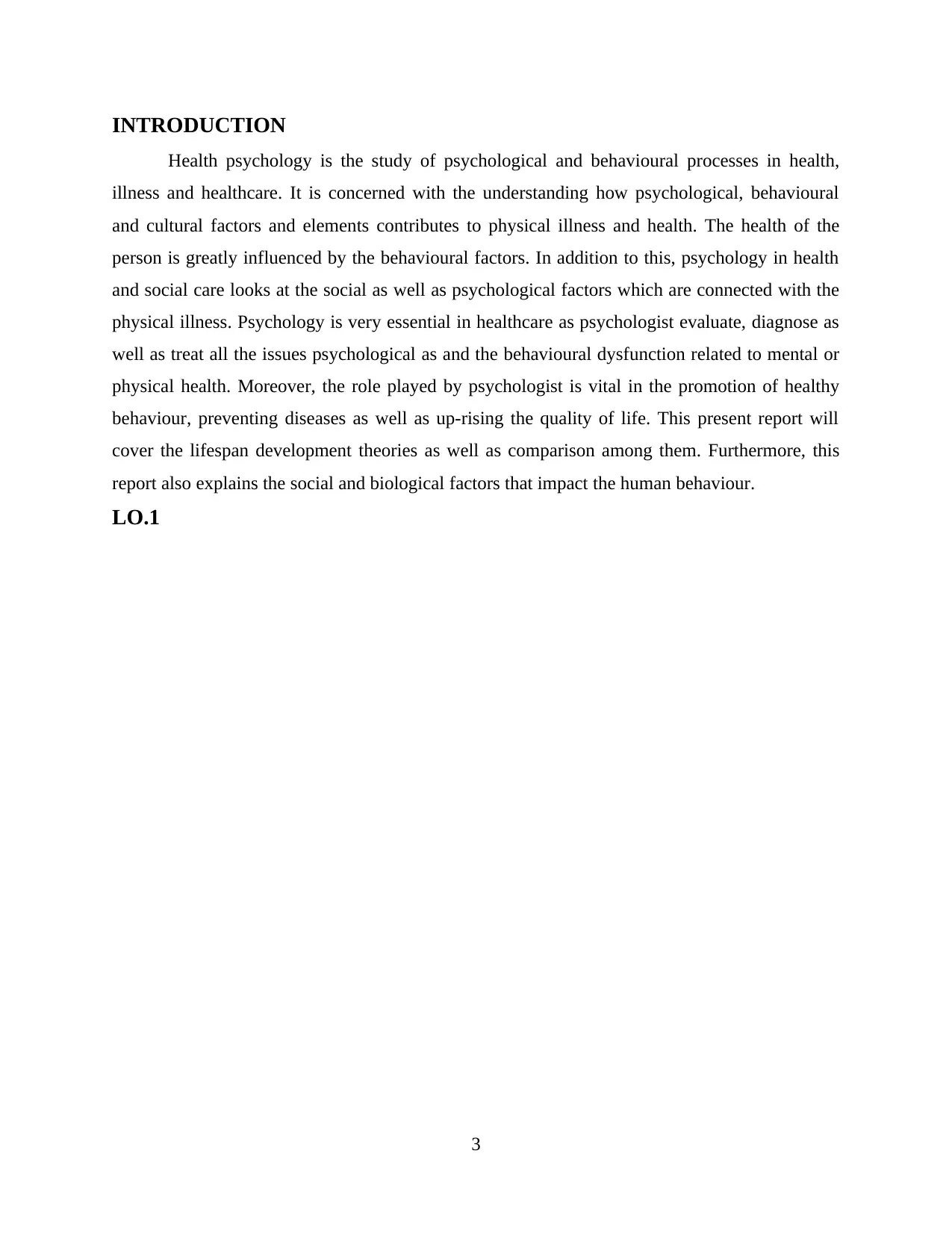
INTRODUCTION
Health psychology is the study of psychological and behavioural processes in health,
illness and healthcare. It is concerned with the understanding how psychological, behavioural
and cultural factors and elements contributes to physical illness and health. The health of the
person is greatly influenced by the behavioural factors. In addition to this, psychology in health
and social care looks at the social as well as psychological factors which are connected with the
physical illness. Psychology is very essential in healthcare as psychologist evaluate, diagnose as
well as treat all the issues psychological as and the behavioural dysfunction related to mental or
physical health. Moreover, the role played by psychologist is vital in the promotion of healthy
behaviour, preventing diseases as well as up-rising the quality of life. This present report will
cover the lifespan development theories as well as comparison among them. Furthermore, this
report also explains the social and biological factors that impact the human behaviour.
LO.1
3
Health psychology is the study of psychological and behavioural processes in health,
illness and healthcare. It is concerned with the understanding how psychological, behavioural
and cultural factors and elements contributes to physical illness and health. The health of the
person is greatly influenced by the behavioural factors. In addition to this, psychology in health
and social care looks at the social as well as psychological factors which are connected with the
physical illness. Psychology is very essential in healthcare as psychologist evaluate, diagnose as
well as treat all the issues psychological as and the behavioural dysfunction related to mental or
physical health. Moreover, the role played by psychologist is vital in the promotion of healthy
behaviour, preventing diseases as well as up-rising the quality of life. This present report will
cover the lifespan development theories as well as comparison among them. Furthermore, this
report also explains the social and biological factors that impact the human behaviour.
LO.1
3
⊘ This is a preview!⊘
Do you want full access?
Subscribe today to unlock all pages.

Trusted by 1+ million students worldwide
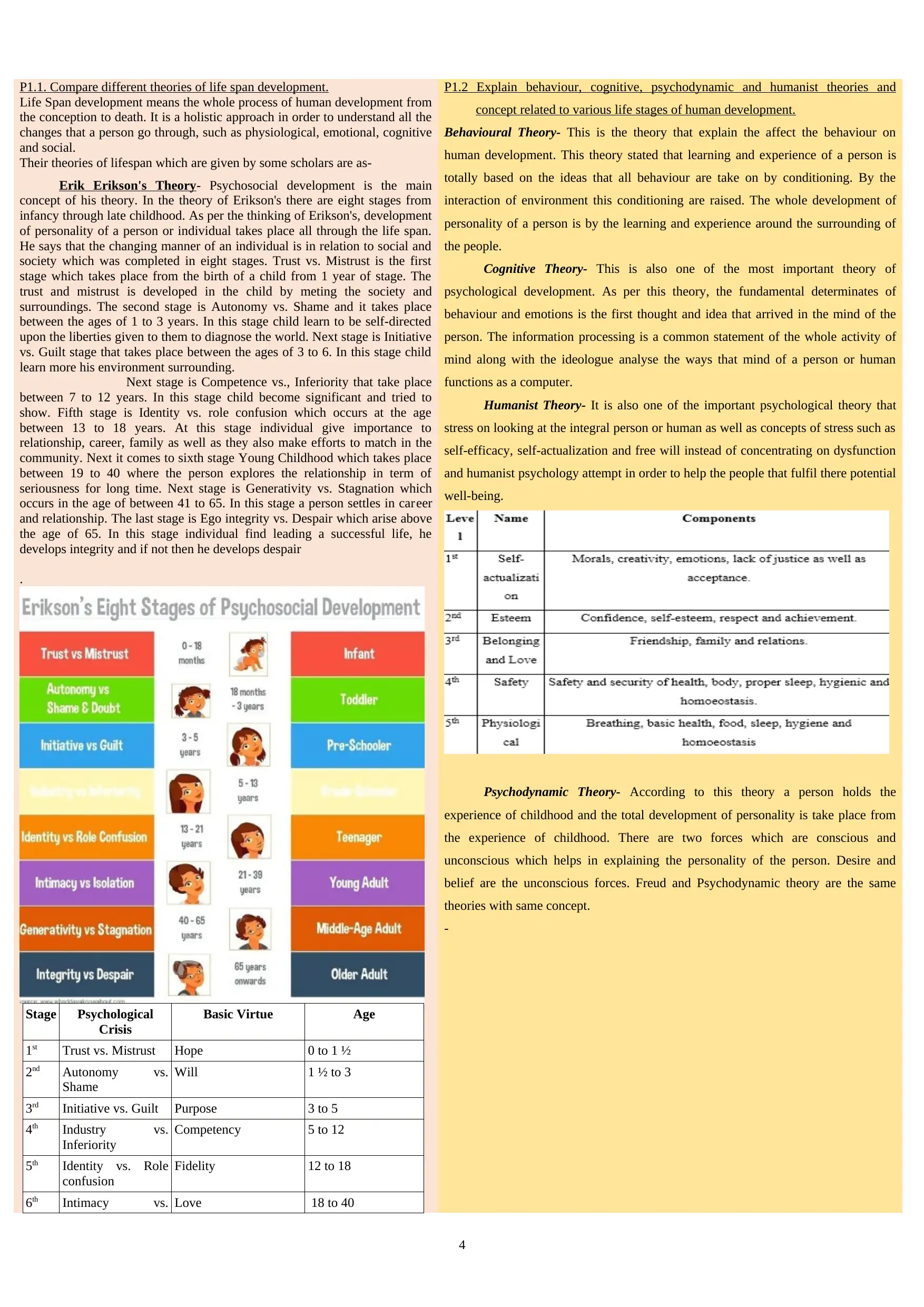
P1.1. Compare different theories of life span development.
Life Span development means the whole process of human development from
the conception to death. It is a holistic approach in order to understand all the
changes that a person go through, such as physiological, emotional, cognitive
and social.
Their theories of lifespan which are given by some scholars are as-
Erik Erikson's Theory- Psychosocial development is the main
concept of his theory. In the theory of Erikson's there are eight stages from
infancy through late childhood. As per the thinking of Erikson's, development
of personality of a person or individual takes place all through the life span.
He says that the changing manner of an individual is in relation to social and
society which was completed in eight stages. Trust vs. Mistrust is the first
stage which takes place from the birth of a child from 1 year of stage. The
trust and mistrust is developed in the child by meting the society and
surroundings. The second stage is Autonomy vs. Shame and it takes place
between the ages of 1 to 3 years. In this stage child learn to be self-directed
upon the liberties given to them to diagnose the world. Next stage is Initiative
vs. Guilt stage that takes place between the ages of 3 to 6. In this stage child
learn more his environment surrounding.
Next stage is Competence vs., Inferiority that take place
between 7 to 12 years. In this stage child become significant and tried to
show. Fifth stage is Identity vs. role confusion which occurs at the age
between 13 to 18 years. At this stage individual give importance to
relationship, career, family as well as they also make efforts to match in the
community. Next it comes to sixth stage Young Childhood which takes place
between 19 to 40 where the person explores the relationship in term of
seriousness for long time. Next stage is Generativity vs. Stagnation which
occurs in the age of between 41 to 65. In this stage a person settles in career
and relationship. The last stage is Ego integrity vs. Despair which arise above
the age of 65. In this stage individual find leading a successful life, he
develops integrity and if not then he develops despair
.
Stage Psychological
Crisis
Basic Virtue Age
1st Trust vs. Mistrust Hope 0 to 1 ½
2nd Autonomy vs.
Shame
Will 1 ½ to 3
3rd Initiative vs. Guilt Purpose 3 to 5
4th Industry vs.
Inferiority
Competency 5 to 12
5th Identity vs. Role
confusion
Fidelity 12 to 18
6th Intimacy vs. Love 18 to 40
P1.2 Explain behaviour, cognitive, psychodynamic and humanist theories and
concept related to various life stages of human development.
Behavioural Theory- This is the theory that explain the affect the behaviour on
human development. This theory stated that learning and experience of a person is
totally based on the ideas that all behaviour are take on by conditioning. By the
interaction of environment this conditioning are raised. The whole development of
personality of a person is by the learning and experience around the surrounding of
the people.
Cognitive Theory- This is also one of the most important theory of
psychological development. As per this theory, the fundamental determinates of
behaviour and emotions is the first thought and idea that arrived in the mind of the
person. The information processing is a common statement of the whole activity of
mind along with the ideologue analyse the ways that mind of a person or human
functions as a computer.
Humanist Theory- It is also one of the important psychological theory that
stress on looking at the integral person or human as well as concepts of stress such as
self-efficacy, self-actualization and free will instead of concentrating on dysfunction
and humanist psychology attempt in order to help the people that fulfil there potential
well-being.
Psychodynamic Theory- According to this theory a person holds the
experience of childhood and the total development of personality is take place from
the experience of childhood. There are two forces which are conscious and
unconscious which helps in explaining the personality of the person. Desire and
belief are the unconscious forces. Freud and Psychodynamic theory are the same
theories with same concept.
-
4
Life Span development means the whole process of human development from
the conception to death. It is a holistic approach in order to understand all the
changes that a person go through, such as physiological, emotional, cognitive
and social.
Their theories of lifespan which are given by some scholars are as-
Erik Erikson's Theory- Psychosocial development is the main
concept of his theory. In the theory of Erikson's there are eight stages from
infancy through late childhood. As per the thinking of Erikson's, development
of personality of a person or individual takes place all through the life span.
He says that the changing manner of an individual is in relation to social and
society which was completed in eight stages. Trust vs. Mistrust is the first
stage which takes place from the birth of a child from 1 year of stage. The
trust and mistrust is developed in the child by meting the society and
surroundings. The second stage is Autonomy vs. Shame and it takes place
between the ages of 1 to 3 years. In this stage child learn to be self-directed
upon the liberties given to them to diagnose the world. Next stage is Initiative
vs. Guilt stage that takes place between the ages of 3 to 6. In this stage child
learn more his environment surrounding.
Next stage is Competence vs., Inferiority that take place
between 7 to 12 years. In this stage child become significant and tried to
show. Fifth stage is Identity vs. role confusion which occurs at the age
between 13 to 18 years. At this stage individual give importance to
relationship, career, family as well as they also make efforts to match in the
community. Next it comes to sixth stage Young Childhood which takes place
between 19 to 40 where the person explores the relationship in term of
seriousness for long time. Next stage is Generativity vs. Stagnation which
occurs in the age of between 41 to 65. In this stage a person settles in career
and relationship. The last stage is Ego integrity vs. Despair which arise above
the age of 65. In this stage individual find leading a successful life, he
develops integrity and if not then he develops despair
.
Stage Psychological
Crisis
Basic Virtue Age
1st Trust vs. Mistrust Hope 0 to 1 ½
2nd Autonomy vs.
Shame
Will 1 ½ to 3
3rd Initiative vs. Guilt Purpose 3 to 5
4th Industry vs.
Inferiority
Competency 5 to 12
5th Identity vs. Role
confusion
Fidelity 12 to 18
6th Intimacy vs. Love 18 to 40
P1.2 Explain behaviour, cognitive, psychodynamic and humanist theories and
concept related to various life stages of human development.
Behavioural Theory- This is the theory that explain the affect the behaviour on
human development. This theory stated that learning and experience of a person is
totally based on the ideas that all behaviour are take on by conditioning. By the
interaction of environment this conditioning are raised. The whole development of
personality of a person is by the learning and experience around the surrounding of
the people.
Cognitive Theory- This is also one of the most important theory of
psychological development. As per this theory, the fundamental determinates of
behaviour and emotions is the first thought and idea that arrived in the mind of the
person. The information processing is a common statement of the whole activity of
mind along with the ideologue analyse the ways that mind of a person or human
functions as a computer.
Humanist Theory- It is also one of the important psychological theory that
stress on looking at the integral person or human as well as concepts of stress such as
self-efficacy, self-actualization and free will instead of concentrating on dysfunction
and humanist psychology attempt in order to help the people that fulfil there potential
well-being.
Psychodynamic Theory- According to this theory a person holds the
experience of childhood and the total development of personality is take place from
the experience of childhood. There are two forces which are conscious and
unconscious which helps in explaining the personality of the person. Desire and
belief are the unconscious forces. Freud and Psychodynamic theory are the same
theories with same concept.
-
4
Paraphrase This Document
Need a fresh take? Get an instant paraphrase of this document with our AI Paraphraser
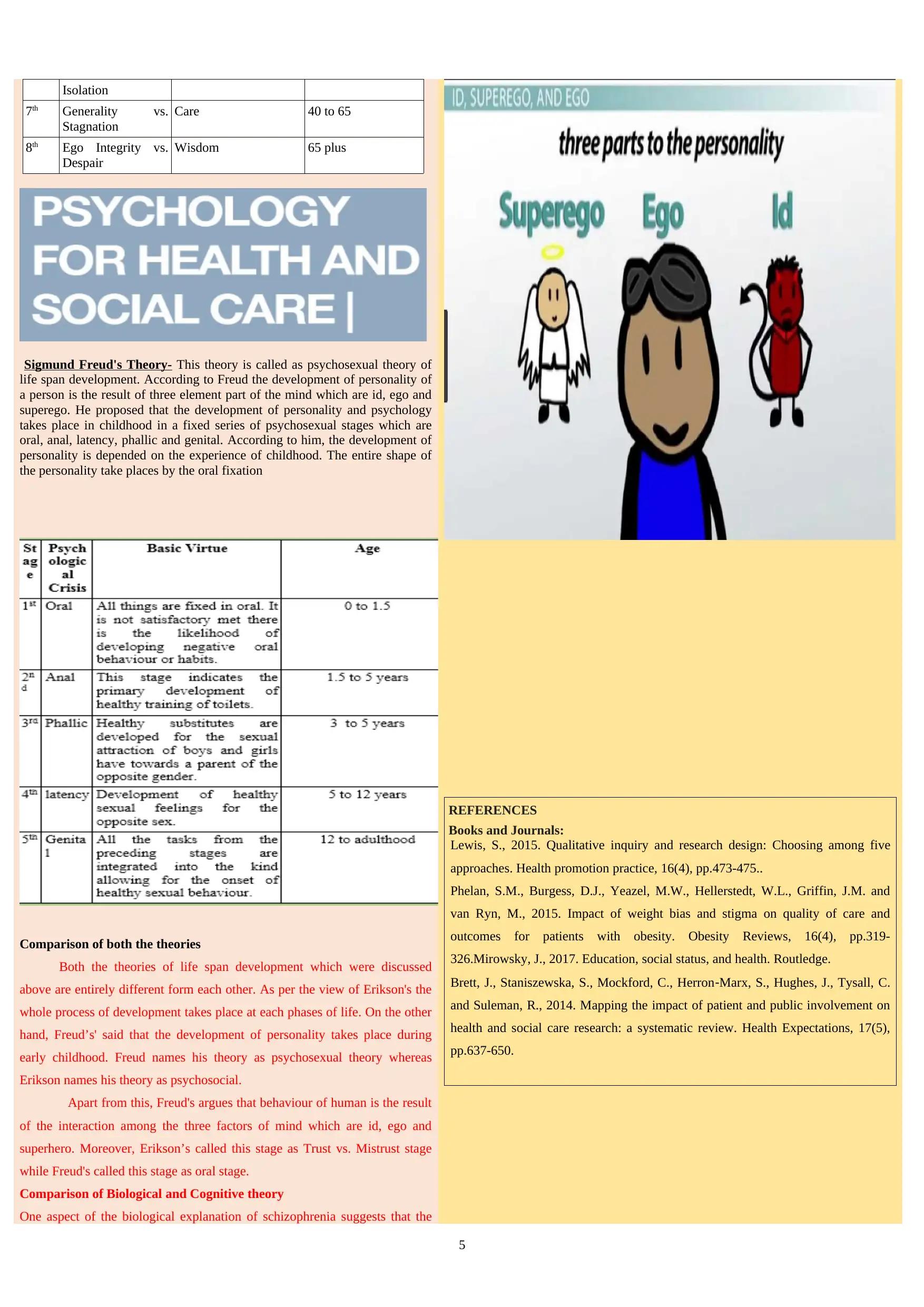
Isolation
7th Generality vs.
Stagnation
Care 40 to 65
8th Ego Integrity vs.
Despair
Wisdom 65 plus
Sigmund Freud's Theory- This theory is called as psychosexual theory of
life span development. According to Freud the development of personality of
a person is the result of three element part of the mind which are id, ego and
superego. He proposed that the development of personality and psychology
takes place in childhood in a fixed series of psychosexual stages which are
oral, anal, latency, phallic and genital. According to him, the development of
personality is depended on the experience of childhood. The entire shape of
the personality take places by the oral fixation
Comparison of both the theories
Both the theories of life span development which were discussed
above are entirely different form each other. As per the view of Erikson's the
whole process of development takes place at each phases of life. On the other
hand, Freud’s' said that the development of personality takes place during
early childhood. Freud names his theory as psychosexual theory whereas
Erikson names his theory as psychosocial.
Apart from this, Freud's argues that behaviour of human is the result
of the interaction among the three factors of mind which are id, ego and
superhero. Moreover, Erikson’s called this stage as Trust vs. Mistrust stage
while Freud's called this stage as oral stage.
Comparison of Biological and Cognitive theory
One aspect of the biological explanation of schizophrenia suggests that the
REFERENCES
Books and Journals:
Lewis, S., 2015. Qualitative inquiry and research design: Choosing among five
approaches. Health promotion practice, 16(4), pp.473-475..
Phelan, S.M., Burgess, D.J., Yeazel, M.W., Hellerstedt, W.L., Griffin, J.M. and
van Ryn, M., 2015. Impact of weight bias and stigma on quality of care and
outcomes for patients with obesity. Obesity Reviews, 16(4), pp.319-
326.Mirowsky, J., 2017. Education, social status, and health. Routledge.
Brett, J., Staniszewska, S., Mockford, C., Herron‐Marx, S., Hughes, J., Tysall, C.
and Suleman, R., 2014. Mapping the impact of patient and public involvement on
health and social care research: a systematic review. Health Expectations, 17(5),
pp.637-650.
5
7th Generality vs.
Stagnation
Care 40 to 65
8th Ego Integrity vs.
Despair
Wisdom 65 plus
Sigmund Freud's Theory- This theory is called as psychosexual theory of
life span development. According to Freud the development of personality of
a person is the result of three element part of the mind which are id, ego and
superego. He proposed that the development of personality and psychology
takes place in childhood in a fixed series of psychosexual stages which are
oral, anal, latency, phallic and genital. According to him, the development of
personality is depended on the experience of childhood. The entire shape of
the personality take places by the oral fixation
Comparison of both the theories
Both the theories of life span development which were discussed
above are entirely different form each other. As per the view of Erikson's the
whole process of development takes place at each phases of life. On the other
hand, Freud’s' said that the development of personality takes place during
early childhood. Freud names his theory as psychosexual theory whereas
Erikson names his theory as psychosocial.
Apart from this, Freud's argues that behaviour of human is the result
of the interaction among the three factors of mind which are id, ego and
superhero. Moreover, Erikson’s called this stage as Trust vs. Mistrust stage
while Freud's called this stage as oral stage.
Comparison of Biological and Cognitive theory
One aspect of the biological explanation of schizophrenia suggests that the
REFERENCES
Books and Journals:
Lewis, S., 2015. Qualitative inquiry and research design: Choosing among five
approaches. Health promotion practice, 16(4), pp.473-475..
Phelan, S.M., Burgess, D.J., Yeazel, M.W., Hellerstedt, W.L., Griffin, J.M. and
van Ryn, M., 2015. Impact of weight bias and stigma on quality of care and
outcomes for patients with obesity. Obesity Reviews, 16(4), pp.319-
326.Mirowsky, J., 2017. Education, social status, and health. Routledge.
Brett, J., Staniszewska, S., Mockford, C., Herron‐Marx, S., Hughes, J., Tysall, C.
and Suleman, R., 2014. Mapping the impact of patient and public involvement on
health and social care research: a systematic review. Health Expectations, 17(5),
pp.637-650.
5

illness is transmitted from parents to their children via genes. It has been
found that a person has a 1% greater chance of developing the schizophrenia
if they have a family relative suffering schizophrenia. One of the
psychological explanations is the psychodynamic approach in which Freud
blames parents for the development of the schizophrenia. A child raised by
uncaring parents will employ the defence mechanism regression,
psychologically reverting back to the oral stage of development
6
found that a person has a 1% greater chance of developing the schizophrenia
if they have a family relative suffering schizophrenia. One of the
psychological explanations is the psychodynamic approach in which Freud
blames parents for the development of the schizophrenia. A child raised by
uncaring parents will employ the defence mechanism regression,
psychologically reverting back to the oral stage of development
6
⊘ This is a preview!⊘
Do you want full access?
Subscribe today to unlock all pages.

Trusted by 1+ million students worldwide
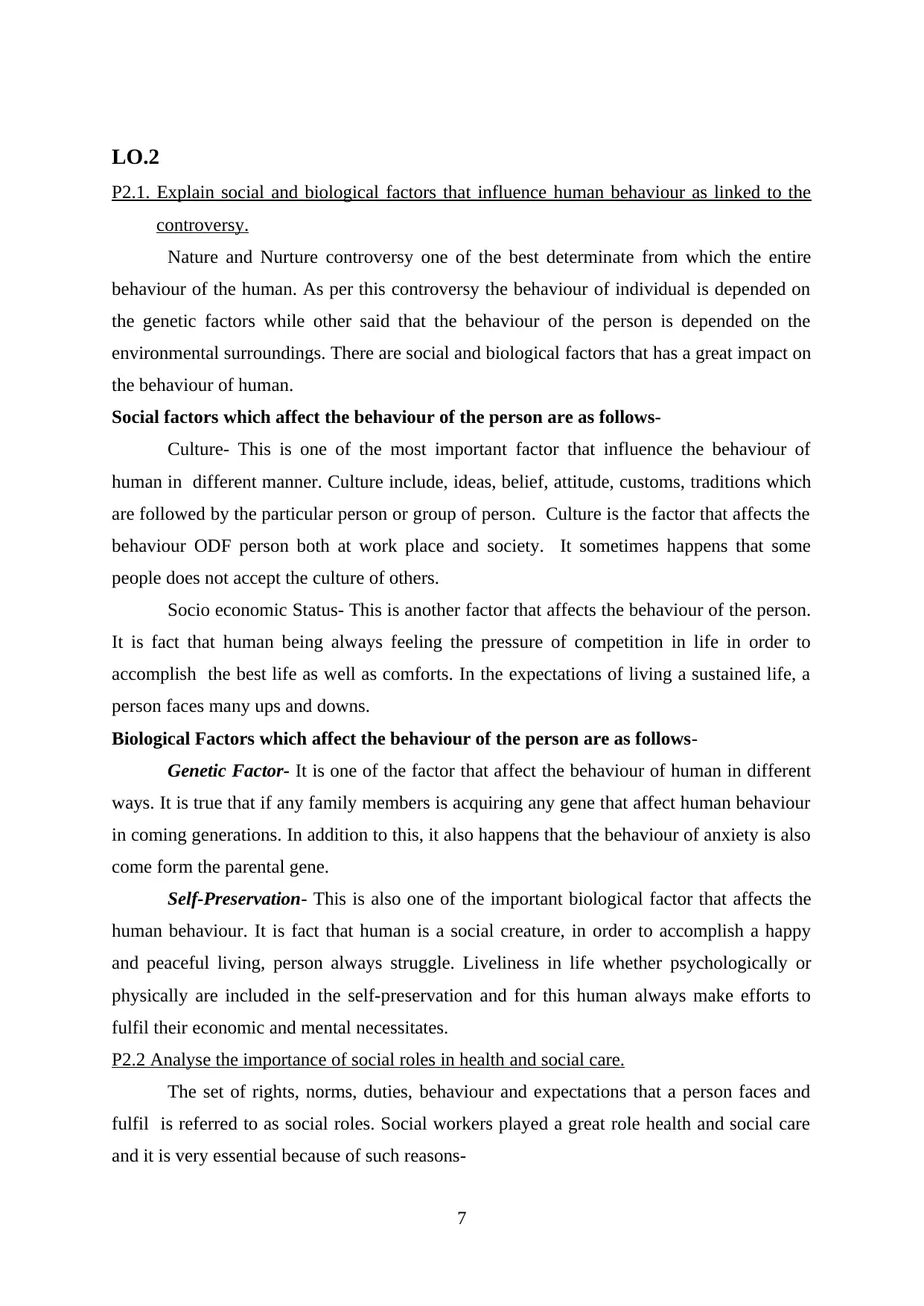
LO.2
P2.1. Explain social and biological factors that influence human behaviour as linked to the
controversy.
Nature and Nurture controversy one of the best determinate from which the entire
behaviour of the human. As per this controversy the behaviour of individual is depended on
the genetic factors while other said that the behaviour of the person is depended on the
environmental surroundings. There are social and biological factors that has a great impact on
the behaviour of human.
Social factors which affect the behaviour of the person are as follows-
Culture- This is one of the most important factor that influence the behaviour of
human in different manner. Culture include, ideas, belief, attitude, customs, traditions which
are followed by the particular person or group of person. Culture is the factor that affects the
behaviour ODF person both at work place and society. It sometimes happens that some
people does not accept the culture of others.
Socio economic Status- This is another factor that affects the behaviour of the person.
It is fact that human being always feeling the pressure of competition in life in order to
accomplish the best life as well as comforts. In the expectations of living a sustained life, a
person faces many ups and downs.
Biological Factors which affect the behaviour of the person are as follows-
Genetic Factor- It is one of the factor that affect the behaviour of human in different
ways. It is true that if any family members is acquiring any gene that affect human behaviour
in coming generations. In addition to this, it also happens that the behaviour of anxiety is also
come form the parental gene.
Self-Preservation- This is also one of the important biological factor that affects the
human behaviour. It is fact that human is a social creature, in order to accomplish a happy
and peaceful living, person always struggle. Liveliness in life whether psychologically or
physically are included in the self-preservation and for this human always make efforts to
fulfil their economic and mental necessitates.
P2.2 Analyse the importance of social roles in health and social care.
The set of rights, norms, duties, behaviour and expectations that a person faces and
fulfil is referred to as social roles. Social workers played a great role health and social care
and it is very essential because of such reasons-
7
P2.1. Explain social and biological factors that influence human behaviour as linked to the
controversy.
Nature and Nurture controversy one of the best determinate from which the entire
behaviour of the human. As per this controversy the behaviour of individual is depended on
the genetic factors while other said that the behaviour of the person is depended on the
environmental surroundings. There are social and biological factors that has a great impact on
the behaviour of human.
Social factors which affect the behaviour of the person are as follows-
Culture- This is one of the most important factor that influence the behaviour of
human in different manner. Culture include, ideas, belief, attitude, customs, traditions which
are followed by the particular person or group of person. Culture is the factor that affects the
behaviour ODF person both at work place and society. It sometimes happens that some
people does not accept the culture of others.
Socio economic Status- This is another factor that affects the behaviour of the person.
It is fact that human being always feeling the pressure of competition in life in order to
accomplish the best life as well as comforts. In the expectations of living a sustained life, a
person faces many ups and downs.
Biological Factors which affect the behaviour of the person are as follows-
Genetic Factor- It is one of the factor that affect the behaviour of human in different
ways. It is true that if any family members is acquiring any gene that affect human behaviour
in coming generations. In addition to this, it also happens that the behaviour of anxiety is also
come form the parental gene.
Self-Preservation- This is also one of the important biological factor that affects the
human behaviour. It is fact that human is a social creature, in order to accomplish a happy
and peaceful living, person always struggle. Liveliness in life whether psychologically or
physically are included in the self-preservation and for this human always make efforts to
fulfil their economic and mental necessitates.
P2.2 Analyse the importance of social roles in health and social care.
The set of rights, norms, duties, behaviour and expectations that a person faces and
fulfil is referred to as social roles. Social workers played a great role health and social care
and it is very essential because of such reasons-
7
Paraphrase This Document
Need a fresh take? Get an instant paraphrase of this document with our AI Paraphraser
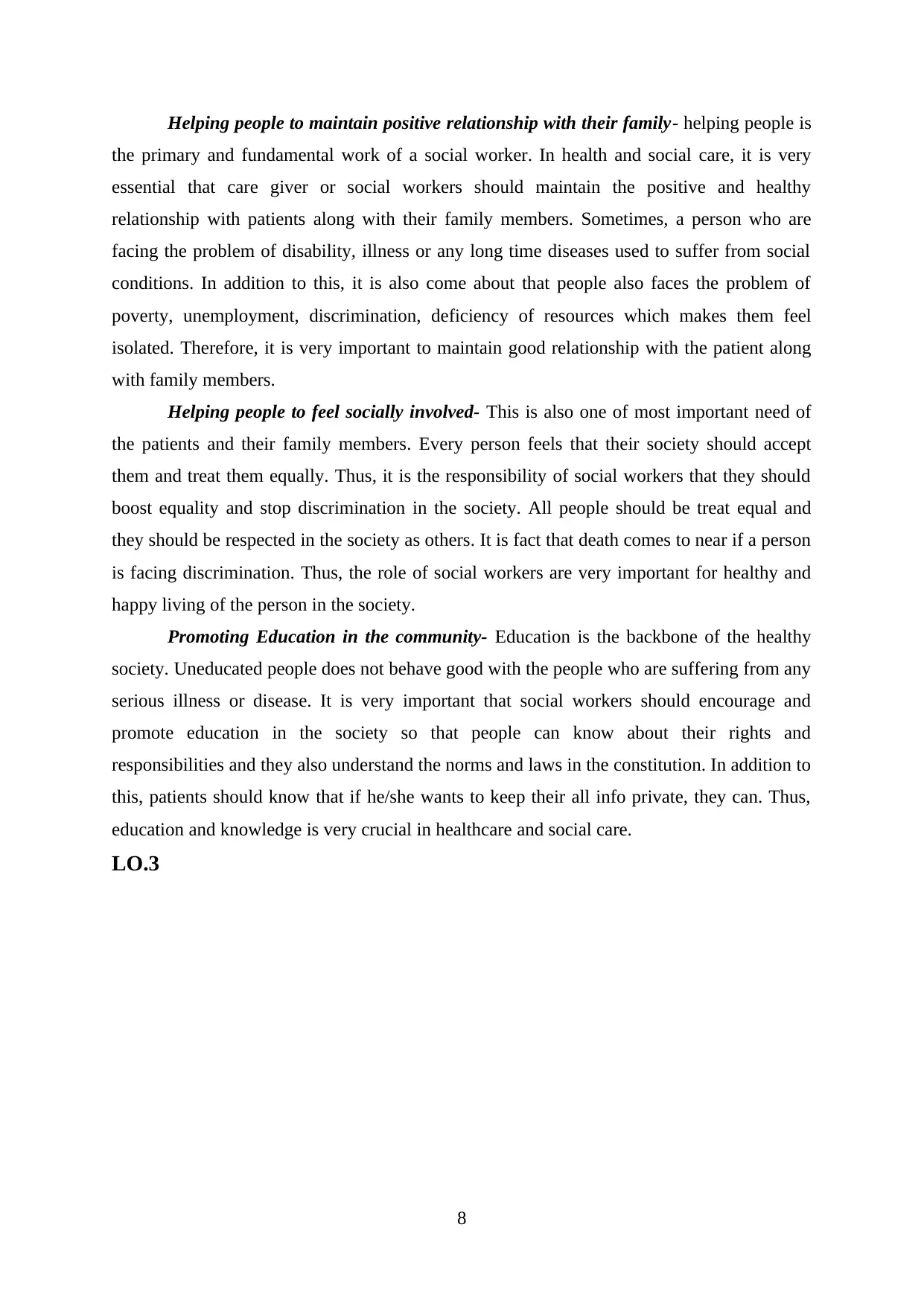
Helping people to maintain positive relationship with their family- helping people is
the primary and fundamental work of a social worker. In health and social care, it is very
essential that care giver or social workers should maintain the positive and healthy
relationship with patients along with their family members. Sometimes, a person who are
facing the problem of disability, illness or any long time diseases used to suffer from social
conditions. In addition to this, it is also come about that people also faces the problem of
poverty, unemployment, discrimination, deficiency of resources which makes them feel
isolated. Therefore, it is very important to maintain good relationship with the patient along
with family members.
Helping people to feel socially involved- This is also one of most important need of
the patients and their family members. Every person feels that their society should accept
them and treat them equally. Thus, it is the responsibility of social workers that they should
boost equality and stop discrimination in the society. All people should be treat equal and
they should be respected in the society as others. It is fact that death comes to near if a person
is facing discrimination. Thus, the role of social workers are very important for healthy and
happy living of the person in the society.
Promoting Education in the community- Education is the backbone of the healthy
society. Uneducated people does not behave good with the people who are suffering from any
serious illness or disease. It is very important that social workers should encourage and
promote education in the society so that people can know about their rights and
responsibilities and they also understand the norms and laws in the constitution. In addition to
this, patients should know that if he/she wants to keep their all info private, they can. Thus,
education and knowledge is very crucial in healthcare and social care.
LO.3
8
the primary and fundamental work of a social worker. In health and social care, it is very
essential that care giver or social workers should maintain the positive and healthy
relationship with patients along with their family members. Sometimes, a person who are
facing the problem of disability, illness or any long time diseases used to suffer from social
conditions. In addition to this, it is also come about that people also faces the problem of
poverty, unemployment, discrimination, deficiency of resources which makes them feel
isolated. Therefore, it is very important to maintain good relationship with the patient along
with family members.
Helping people to feel socially involved- This is also one of most important need of
the patients and their family members. Every person feels that their society should accept
them and treat them equally. Thus, it is the responsibility of social workers that they should
boost equality and stop discrimination in the society. All people should be treat equal and
they should be respected in the society as others. It is fact that death comes to near if a person
is facing discrimination. Thus, the role of social workers are very important for healthy and
happy living of the person in the society.
Promoting Education in the community- Education is the backbone of the healthy
society. Uneducated people does not behave good with the people who are suffering from any
serious illness or disease. It is very important that social workers should encourage and
promote education in the society so that people can know about their rights and
responsibilities and they also understand the norms and laws in the constitution. In addition to
this, patients should know that if he/she wants to keep their all info private, they can. Thus,
education and knowledge is very crucial in healthcare and social care.
LO.3
8
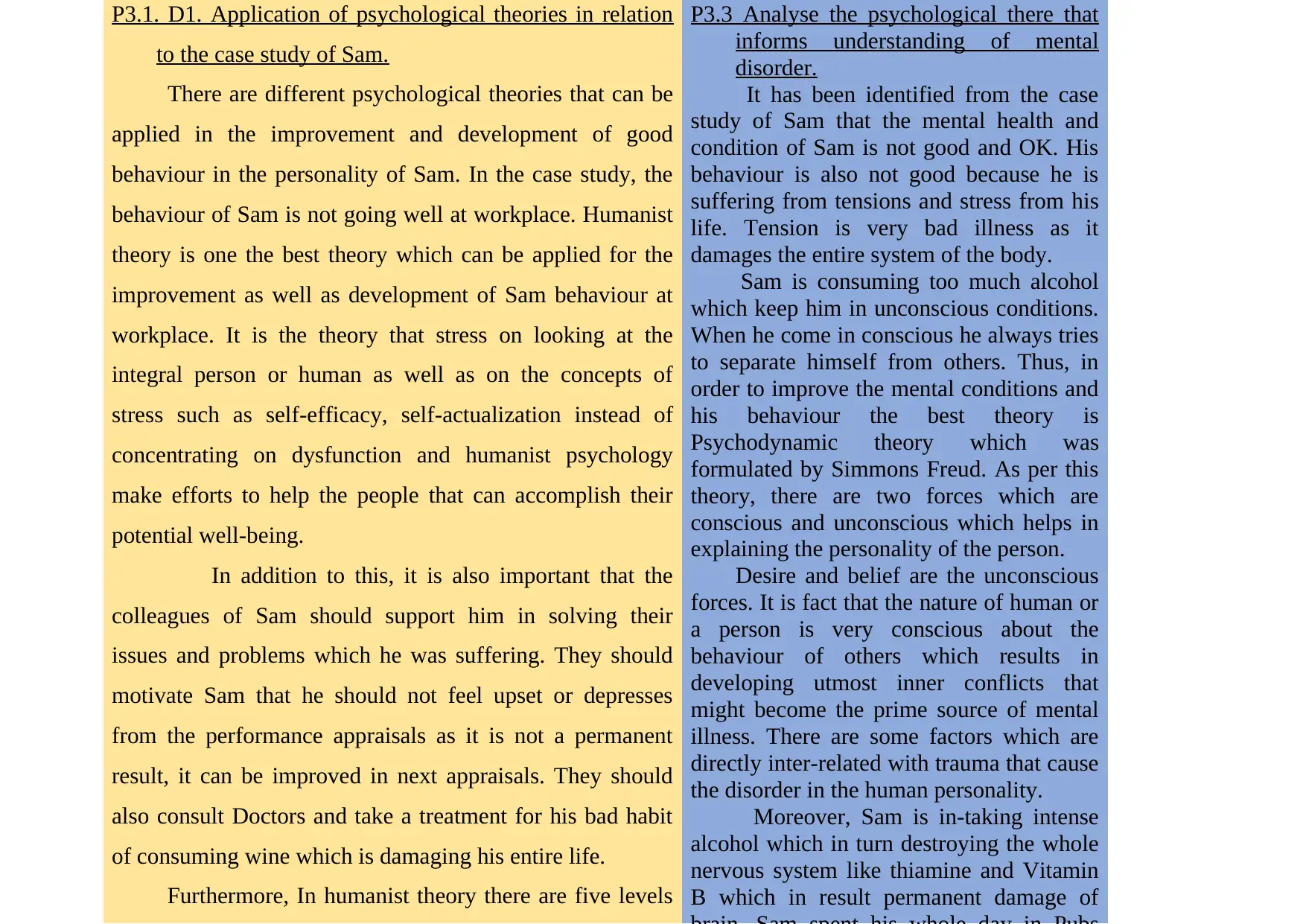
9
P3.1. D1. Application of psychological theories in relation
to the case study of Sam.
There are different psychological theories that can be
applied in the improvement and development of good
behaviour in the personality of Sam. In the case study, the
behaviour of Sam is not going well at workplace. Humanist
theory is one the best theory which can be applied for the
improvement as well as development of Sam behaviour at
workplace. It is the theory that stress on looking at the
integral person or human as well as on the concepts of
stress such as self-efficacy, self-actualization instead of
concentrating on dysfunction and humanist psychology
make efforts to help the people that can accomplish their
potential well-being.
In addition to this, it is also important that the
colleagues of Sam should support him in solving their
issues and problems which he was suffering. They should
motivate Sam that he should not feel upset or depresses
from the performance appraisals as it is not a permanent
result, it can be improved in next appraisals. They should
also consult Doctors and take a treatment for his bad habit
of consuming wine which is damaging his entire life.
Furthermore, In humanist theory there are five levels
P3.3 Analyse the psychological there that
informs understanding of mental
disorder.
It has been identified from the case
study of Sam that the mental health and
condition of Sam is not good and OK. His
behaviour is also not good because he is
suffering from tensions and stress from his
life. Tension is very bad illness as it
damages the entire system of the body.
Sam is consuming too much alcohol
which keep him in unconscious conditions.
When he come in conscious he always tries
to separate himself from others. Thus, in
order to improve the mental conditions and
his behaviour the best theory is
Psychodynamic theory which was
formulated by Simmons Freud. As per this
theory, there are two forces which are
conscious and unconscious which helps in
explaining the personality of the person.
Desire and belief are the unconscious
forces. It is fact that the nature of human or
a person is very conscious about the
behaviour of others which results in
developing utmost inner conflicts that
might become the prime source of mental
illness. There are some factors which are
directly inter-related with trauma that cause
the disorder in the human personality.
Moreover, Sam is in-taking intense
alcohol which in turn destroying the whole
nervous system like thiamine and Vitamin
B which in result permanent damage of
P3.1. D1. Application of psychological theories in relation
to the case study of Sam.
There are different psychological theories that can be
applied in the improvement and development of good
behaviour in the personality of Sam. In the case study, the
behaviour of Sam is not going well at workplace. Humanist
theory is one the best theory which can be applied for the
improvement as well as development of Sam behaviour at
workplace. It is the theory that stress on looking at the
integral person or human as well as on the concepts of
stress such as self-efficacy, self-actualization instead of
concentrating on dysfunction and humanist psychology
make efforts to help the people that can accomplish their
potential well-being.
In addition to this, it is also important that the
colleagues of Sam should support him in solving their
issues and problems which he was suffering. They should
motivate Sam that he should not feel upset or depresses
from the performance appraisals as it is not a permanent
result, it can be improved in next appraisals. They should
also consult Doctors and take a treatment for his bad habit
of consuming wine which is damaging his entire life.
Furthermore, In humanist theory there are five levels
P3.3 Analyse the psychological there that
informs understanding of mental
disorder.
It has been identified from the case
study of Sam that the mental health and
condition of Sam is not good and OK. His
behaviour is also not good because he is
suffering from tensions and stress from his
life. Tension is very bad illness as it
damages the entire system of the body.
Sam is consuming too much alcohol
which keep him in unconscious conditions.
When he come in conscious he always tries
to separate himself from others. Thus, in
order to improve the mental conditions and
his behaviour the best theory is
Psychodynamic theory which was
formulated by Simmons Freud. As per this
theory, there are two forces which are
conscious and unconscious which helps in
explaining the personality of the person.
Desire and belief are the unconscious
forces. It is fact that the nature of human or
a person is very conscious about the
behaviour of others which results in
developing utmost inner conflicts that
might become the prime source of mental
illness. There are some factors which are
directly inter-related with trauma that cause
the disorder in the human personality.
Moreover, Sam is in-taking intense
alcohol which in turn destroying the whole
nervous system like thiamine and Vitamin
B which in result permanent damage of
⊘ This is a preview!⊘
Do you want full access?
Subscribe today to unlock all pages.

Trusted by 1+ million students worldwide
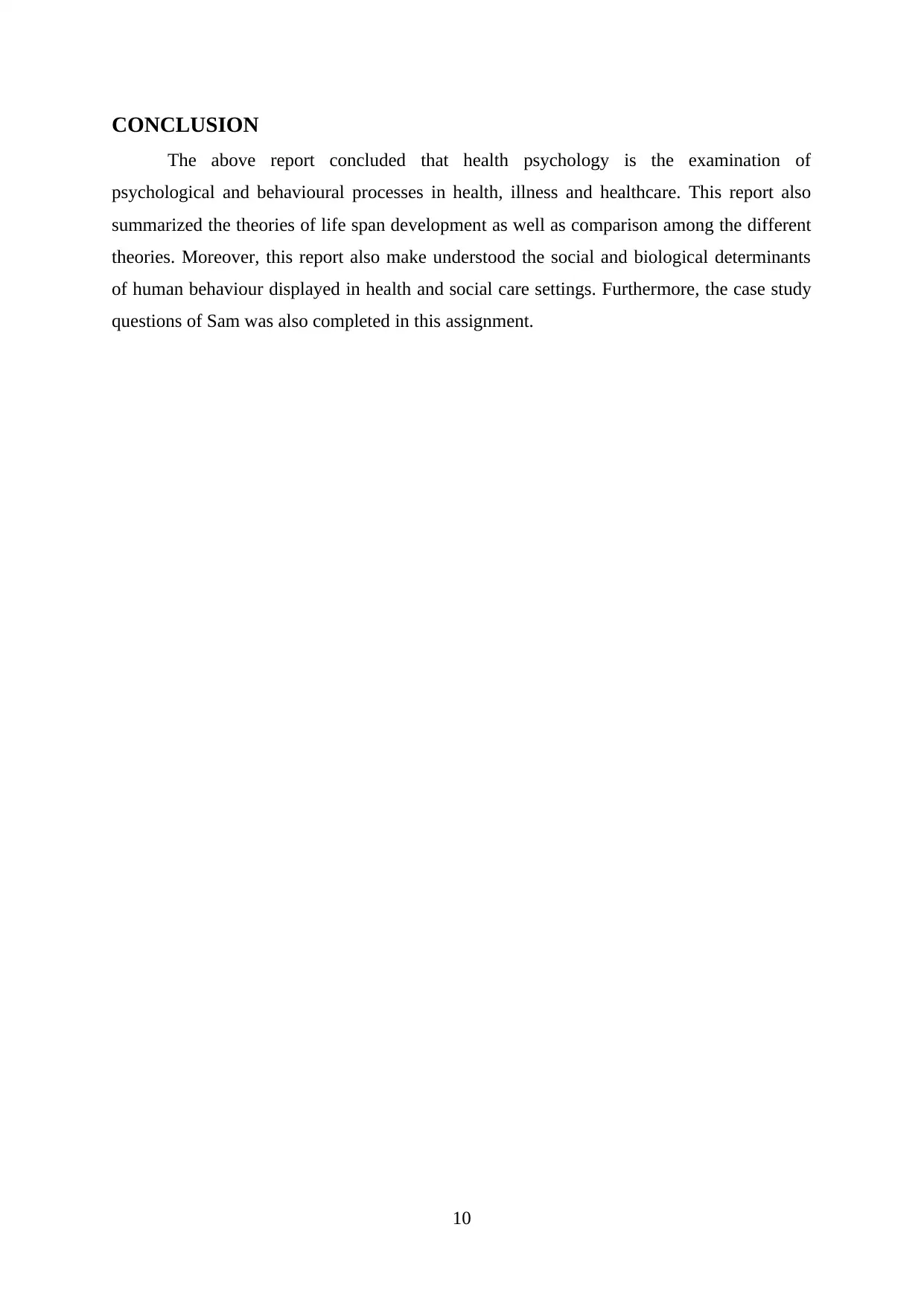
CONCLUSION
The above report concluded that health psychology is the examination of
psychological and behavioural processes in health, illness and healthcare. This report also
summarized the theories of life span development as well as comparison among the different
theories. Moreover, this report also make understood the social and biological determinants
of human behaviour displayed in health and social care settings. Furthermore, the case study
questions of Sam was also completed in this assignment.
10
The above report concluded that health psychology is the examination of
psychological and behavioural processes in health, illness and healthcare. This report also
summarized the theories of life span development as well as comparison among the different
theories. Moreover, this report also make understood the social and biological determinants
of human behaviour displayed in health and social care settings. Furthermore, the case study
questions of Sam was also completed in this assignment.
10
Paraphrase This Document
Need a fresh take? Get an instant paraphrase of this document with our AI Paraphraser
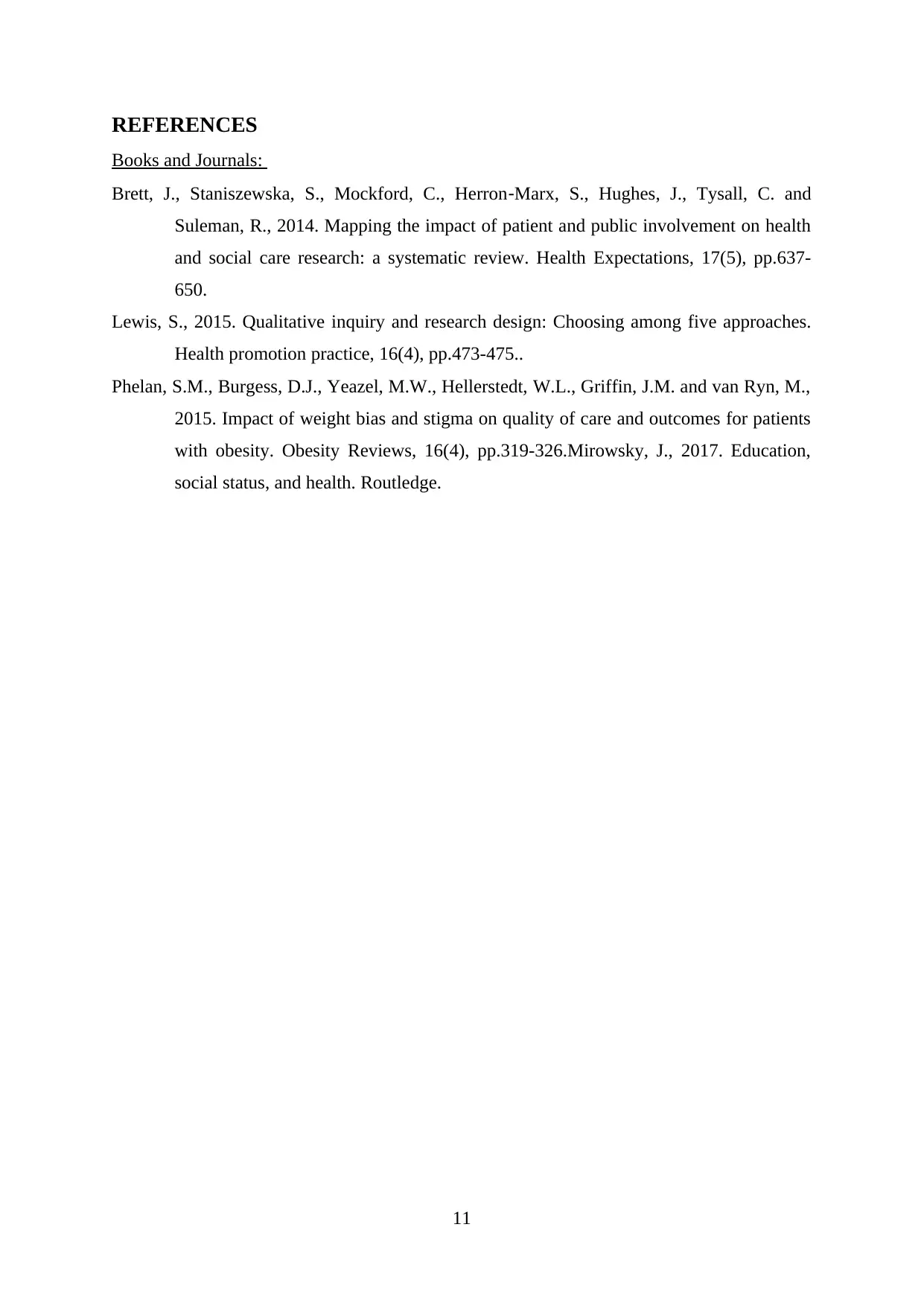
REFERENCES
Books and Journals:
Brett, J., Staniszewska, S., Mockford, C., Herron‐Marx, S., Hughes, J., Tysall, C. and
Suleman, R., 2014. Mapping the impact of patient and public involvement on health
and social care research: a systematic review. Health Expectations, 17(5), pp.637-
650.
Lewis, S., 2015. Qualitative inquiry and research design: Choosing among five approaches.
Health promotion practice, 16(4), pp.473-475..
Phelan, S.M., Burgess, D.J., Yeazel, M.W., Hellerstedt, W.L., Griffin, J.M. and van Ryn, M.,
2015. Impact of weight bias and stigma on quality of care and outcomes for patients
with obesity. Obesity Reviews, 16(4), pp.319-326.Mirowsky, J., 2017. Education,
social status, and health. Routledge.
11
Books and Journals:
Brett, J., Staniszewska, S., Mockford, C., Herron‐Marx, S., Hughes, J., Tysall, C. and
Suleman, R., 2014. Mapping the impact of patient and public involvement on health
and social care research: a systematic review. Health Expectations, 17(5), pp.637-
650.
Lewis, S., 2015. Qualitative inquiry and research design: Choosing among five approaches.
Health promotion practice, 16(4), pp.473-475..
Phelan, S.M., Burgess, D.J., Yeazel, M.W., Hellerstedt, W.L., Griffin, J.M. and van Ryn, M.,
2015. Impact of weight bias and stigma on quality of care and outcomes for patients
with obesity. Obesity Reviews, 16(4), pp.319-326.Mirowsky, J., 2017. Education,
social status, and health. Routledge.
11
1 out of 11
Related Documents
Your All-in-One AI-Powered Toolkit for Academic Success.
+13062052269
info@desklib.com
Available 24*7 on WhatsApp / Email
![[object Object]](/_next/static/media/star-bottom.7253800d.svg)
Unlock your academic potential
Copyright © 2020–2026 A2Z Services. All Rights Reserved. Developed and managed by ZUCOL.





